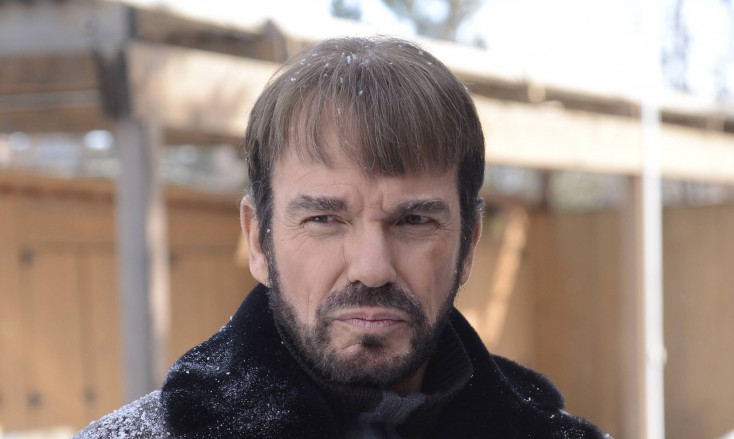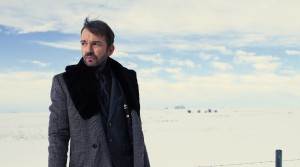By ANGELA DAWSON
Front Row Features
HOLLYWOOD—As the mysterious and violent Lorne Malvo, Billy Bob Thornton has served as a thorn in the side of put-upon insurance salesman Lester Nygaard (Martin Freeman) for 10 episodes of the dark comedy series “Fargo,” on FX. He’s also eluded local Deputy Molly Solverson (Allison Tolman) and Duluth police officer Gus Grimly (Colin Hanks), who suspect he and Nygaard are connected to a series of murders in the small town of Bemidji, Minnesota.
Throughout the season, viewers wondered who—and what—this Malvo character was. He arrived in town just as Nygaard reached his breaking point with his longtime nemesis, who had humiliated him and broke his nose on the street and his emasculating wife, who was always disappointed with him. Malvo makes a deal with Nygaard that leads to his undoing.
As the season drew to its final episode, Thornton spoke by phone about his very dark TV character, being part of a show inspired by the Coen brother’s hit 1996 film and working in the sub-freezing temperatures.
Q: Throughout the series, your character has killed a lot of people and you’ve had a lot of shooting scenes and blood and all that to work with. How do you feel about doing those violent scenes?
Thornton: I’ve been doing this for 30-something years, so you get used to it, although this time I’m the giver rather than the receiver. I’m usually the receiver. What you want to do is you want to try to stay in a world of reality as much as possible, so you don’t think of it as fake blood or anything like that. You just want to stay inside the scene as if you’re really doing the stuff. The main trick is just keeping your head on straight and never getting outside of the scene. The main thing as an actor is you just have to try to ignore anything else and just do things as if you’re doing it.
Q: Throughout the series, Lorne has been baiting Lester. Do you think if Lester hadn’t responded to him, he would have walked away?
Thornton: Malvo is kind of like a cat with a mouse. The temptation would have probably been too great. I’m not sure he could have left him alone. Malvo is almost like God and the devil wrapped into one, and these things were just going to happen. I think a lot of this is about faith. You always think about if I’d only gotten on my motorcycle two minutes later, then I wouldn’t have hit that deer or whatever.
Q: Malvo is as sinister as he is mysterious. You don’t know where he came from or what he did before. Can you just talk about your approach in playing a guy like that? Did you give him a back-story?
Thornton: This is probably the only character I’ve ever played, frankly, that has no conscience, but he has no back-story. I chose to not think about that because Malvo is an animal, and animals are eating machines. I thought if I came up with a back-story, it might cause too much emotion for the character. It might give me too many reasons to do things and I didn’t want to do that.
Q: What do you think of your character’s arc?
Thornton: Noah (Hawley, the show’s creator) wrote a terrific 10-hour movie. It has a beginning, a middle, and an end, and that was one of the things that appealed to me about it. It’s just very well thought-out and I was very happy with it. I haven’t seen the last episode myself. Every Tuesday night I just watch it. It’s an ensemble cast so I’m not always (on set) when other people are doing their thing, so it’s kind of like watching it fresh for me.
Q: Were there any surprises for you in terms of where the story went?
Thornton: It’s kind of the way Hitchcock did things. He always thought it was scarier when you knew from the opening frame who the bad guy is. That way the audience is afraid every time he’s around, so it’s not like the butler did it, or something like that. I’ll just say it’s a very well thought-out and very well-rounded series.
Q: There’s been lots of chatter about a second season. Would you like to see that even if you weren’t necessarily involved?
Thornton: Oh sure. As an audience member I’d love to see it. If they did do another one, it would be a new story with some new characters and that kind of thing, and absolutely I would love to see it.
Q: In some shots he reminds of the vampire Nosferatu. He’s very still and surprises people with his sudden appearance.
Thornton: No one else has compared Malvo to Nosferatu, but that’s pretty good. I like that. A lot of that is just because after years and years of injuries and weighing 140 pounds, I look like Homer Simpson’s boss to start with, my physicality, so some of it is just natural. (He chuckles.) But I did choose to be very sort of slinky. I did choose to be very quiet, but not like purposely menacing.
Q: As a southern gentleman, how was it working on location in cold Calgary? How did you cope with the conditions, and did you go any place after you finished shooting to defrost?
Thornton: I live in Los Angeles, so yes, I definitely came home and defrosted, no question about it. I really loved shooting in Calgary. The crew was great and the people in western Canada really remind me of home folks a lot, so it’s very comfortable. The weather, however, was miserable. Even the Canadian crew said that was the worst winter they’d had in years and years. Sometimes when we’d get to work, they would all be happy because it was 4 degrees. And we (Americans would) say, “No, no, you don’t understand something that’s winter to us, so 4 degrees doesn’t mean anything to us.” I was there off and on. I’d work 10 days and be off for seven and come home, so I got to fly home quite a bit. When you have sinus and allergy trouble like I do, sometimes that’s a problem, because you go from one extreme to the other and you end up having a cold all the time. A lot of us were sick.
Q: Do you have a favorite scene or moment from the series?
Thornton: I really enjoyed the scenes that I did with Martin. There’s a scene in a little café where I tell him about how he needs to be a man and step up and realize that we were once apes. I like the opening scene where he and I meet each other in the lobby of the waiting room of the hospital, and the scene with Colin Hanks and me at the end of the pilot episode, where we first meet each other in the car. I remember those as particularly good moments.
Q: What is Malvo? Is he just the embodiment of evil?
Thornton: People say Malvo’s like the devil. I think he’s more like God and the devil It’s almost as if whether he knows it or not, Malvo is there to facilitate people’s true selves. It’s like he brings out in people who they really are. He’s very impatient with people who are stupid or if they’re ridiculous. Malvo likes to get to the root of what everything is about and sometimes he has to mess with people in order to do that. But I think Malvo symbolizes that sort of spirit in the world that ultimately brings to the surface who people really are.
Q: When you play a dark character, how do you shake it when you get home?
Thornton: I’ve never had a real problem with it. I’m pretty able to just go home and have an omelet. I’m not really the type to let it permeate my life. Maybe when I was doing “Bad Santa” to a degree, maybe I probably drank a little more beer during that time than I normally have in my life because I’m kind of a lightweight. For the most part I don’t let it creep into my regular life. It was really interesting playing a character like this who had no conscience, though. I’ve never done that. When I played odd characters or whatever, they usually had their softer side, but Malvo is pretty straight ahead. He’s not worried about the consequences.
Q: Everybody wants to survive and people will do sinister things to survive, and can you relate to that line or idea at all in your career or otherwise?
Thornton: It’s certainly hard to survive in Hollywood, so that’s one place where I’d probably put that as a practice. Also, I grew up poor and in a rough way, so I’ve had to be a chameleon at some points in my life, both in my career and as a person. I always had a knack for if I’m hanging around English people, I think I probably get a little fancier. If I’m hanging out with the folks back home, it’s easier to fall in with that vibe. So I’ve always been very aware of who I need to be in a certain situation and it’ll get you out of a knifing sometimes, I’ll tell you that much.





